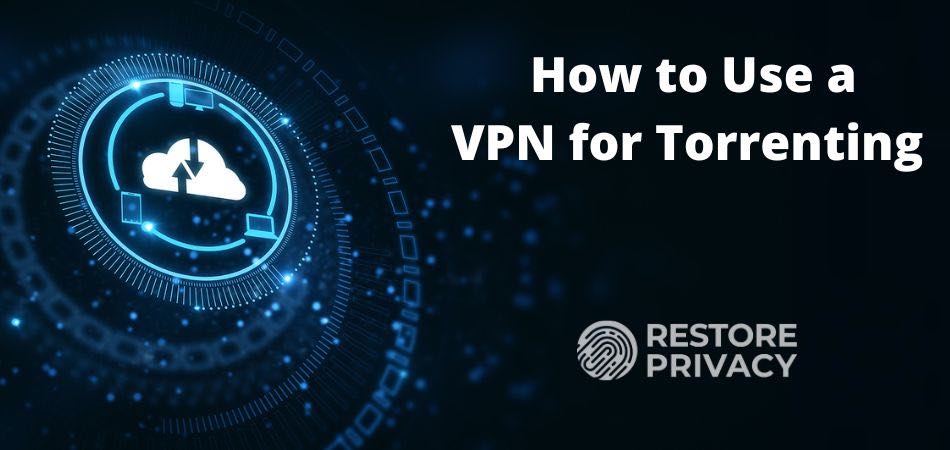
Torrenting can be an efficient way to share large files over the internet, but it can also expose you to numerous risks and legal issues. By learning how to use a VPN for torrenting, you can safely and efficiently practice file sharing while protecting your privacy and complying with copyright laws.
In this comprehensive guide, we’ll help you set up your VPN for torrenting, optimize its use, and explore advanced techniques to ensure a smooth and secure torrenting experience. Let’s get started!
Key takeaways for using a VPN for torrenting
- Set up a reliable VPN for torrenting by selecting an appropriate VPN service, configuring the settings, and verifying the connection.
- Based on the latest test results, the best VPN for torrenting is NordVPN, and it comes with a 74% off coupon here.
- Ensure secure torrenting with features such as next-gen encryption, kill switches, ad blocking, and leak protection.
- Download files from reputable sources and follow legal and safety guidelines to torrent securely and privately.
Setting Up Your VPN for Torrenting
Torrenting without a VPN can leave you vulnerable to legal repercussions, data breaches, and the exposure of your personal information. The best VPNs for torrenting serve as a shield against these risks. The process of torrenting with a VPN involves selecting the right VPN service, configuring VPN settings, and verifying the connection for optimal performance and security.
Choosing the Right VPN Service
When selecting a torrenting VPN service, things worth looking for include P2P (peer-to-peer) support, strong security features, and a large server network. A reliable VPN service like NordVPN, for example, is renowned for its torrenting capabilities, offering fast, secure torrents in addition to its full set of high-end features.
Another factor to look for would be VPN software with built-in ad and malware blocking to prevent downloading these problems while torrenting. Some of the best VPNs for torrenting are also among the best VPNs with ad blocking. Both NordVPN with Threat Protection and Surfshark with CleanWeb fall into this category.
Some VPNs that offer 24/7 live chat technical support and a risk-free 30-day trial with no restrictions are also good VPNs for torrenting. See our guide on the best free trial VPNs to learn more.
Though free VPNs may seem appealing, they frequently cut corners on security and performance, endangering your privacy and data. Some even log user data and sell it to the highest bidder. To avoid these issues, consider using a reputable free VPN service that prioritizes user security and performance.
But be aware that even the best free VPN services have limitations when it comes to torrenting. These range from limited speeds on their free servers to limits on the amount of data you can download using the free plan, to outright bans on torrenting with the free version of the VPN.
NordVPN – The Best All-Around VPN for Torrenting
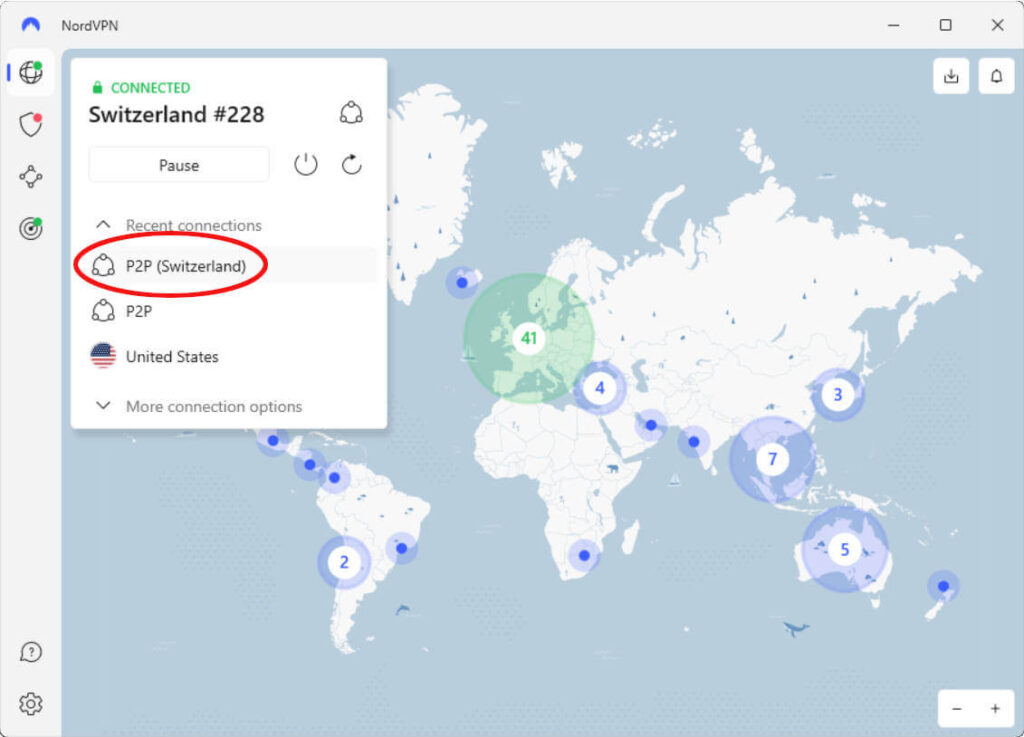
If you are unsure which is the best torrenting VPN for you, you can’t go wrong with NordVPN. It offers specialized P2P servers that are optimized for torrent file transfers, ensuring you get the highest possible speeds while maintaining security. It has a strict, audited no-logs policy and is one of the best no-logs VPNs, ensuring that you can download torrents safely and privately.
We’ve tested NordVPN with some of the leading torrent clients to confirm that everything works the way you would expect. Here are NordVPN and uTorrent working to seed some torrents using a P2P server in Iceland:
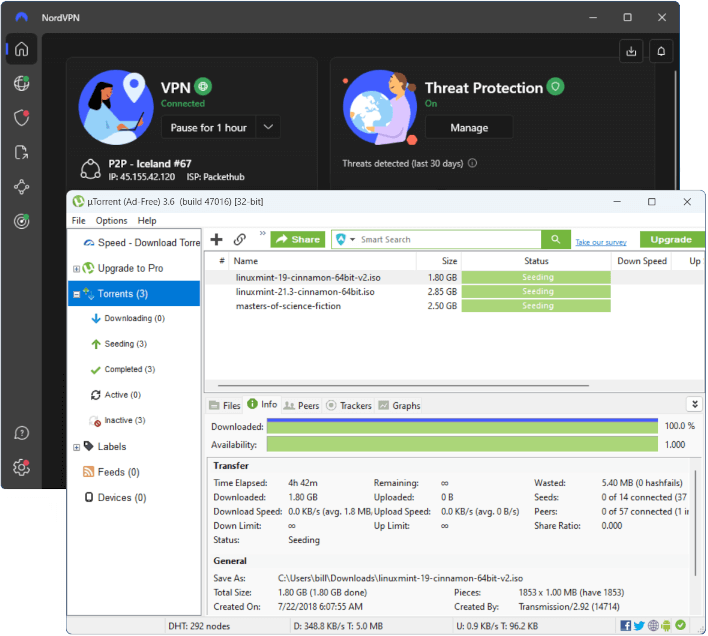
We also confirmed that NordVPN and qBittorrent worked together without problems. Here you can see qBittorrent downloading an Ubuntu torrent using NordVPN, which is connected to a P2P server in Switzerland:
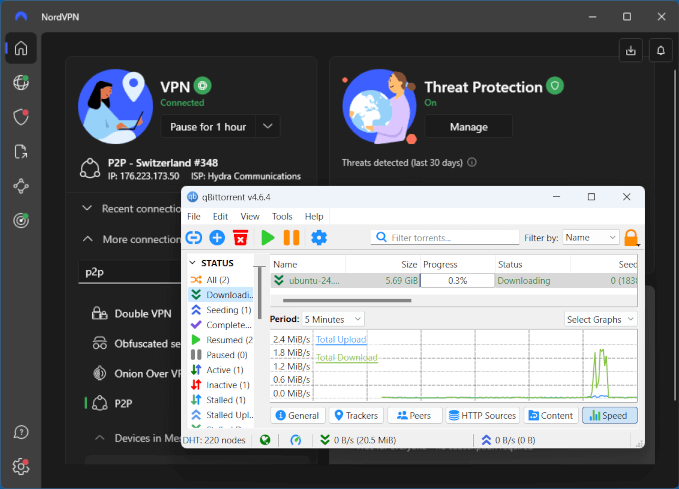
NordVPN works smoothly with multiple torrent apps and is full of features that increase your security and privacy when torrenting. It uses the very fast and very secure WireGuard VPN protocol (integrated into a privacy-boosting NordVPN protocol called NordLynx) for better performance, and is one of the best VPNs with WireGuard support. NordVPN also has a variety of specialized VPN servers, including double-VPN servers for those times when security trumps torrenting speeds. And don’t forget Threat Protection, perhaps the best ad, tracker, and malware blocker available today.
NordVPN is a consistent leader in virtually every category we test, and wins in head-to-head competitions against other premium VPN services as you can see in these guides:
- NordVPN vs Surfshark VPN
- NordVPN vs ExpressVPN
- NordVPN vs Proton VPN
- NordVPN vs CyberGhost
- NordVPN vs IPVanish
These are only a few of the reasons it makes sense to pair NordVPN with your favorite torrent client. Find out more in our complete NordVPN torrenting guide.
NordVPN’s Black Friday Deal is live:
Get 74% Off NordVPN with 2-year subscriptions plus 3 extra months:
(Coupon is applied automatically; 30 day money-back guarantee.)
If you want to get an idea of the full range of what this powerful VPN can do, check out our updated NordVPN review.
Configuring VPN Settings
Once you’ve chosen a suitable VPN provider, configure the VPN settings to ensure safe torrenting. Enable features such as:
Next-gen VPN protocols like the WireGuard VPN protocol, NordLynx protocol, or the Lightway protocol. These protocols are all faster and more secure than the previous generation of VPN protocols.
Kill switches cut off your internet traffic if the connection to the VPN server is lost. This prevents your torrenting traffic from appearing on the internet without the encryption and other protections that the VPN provides.
Leak protection prevents your IP address from being accidentally exposed while DNS leak protection prevents your DNS requests from being visible to your ISP and other third parties.
These features will safeguard your online activities in all cases, including if the VPN connection drops, preventing your real IP address from being exposed. Various options are available for configuring split tunneling including routing only the torrent traffic through the VPN while other internet traffic bypasses it.
Some VPNs also offer a VPN dedicated IP feature, which will give you your own IP address. We see this with the NordVPN dedicated IP feature, and also the Surfshark dedicated IP option. You may want to avoid this feature, however, if you are using a VPN for torrenting. That’s because you may get better performance and speeds by using your VPN’s dedicated P2P torrenting servers.
You’ll want to make sure that your real IP address is hidden before you start torrenting. You can do this by connecting to the VPN server you are going to use, and then browsing to WhatIsMyIP.net. If your actual IP address does not show up on this page, you are protected.
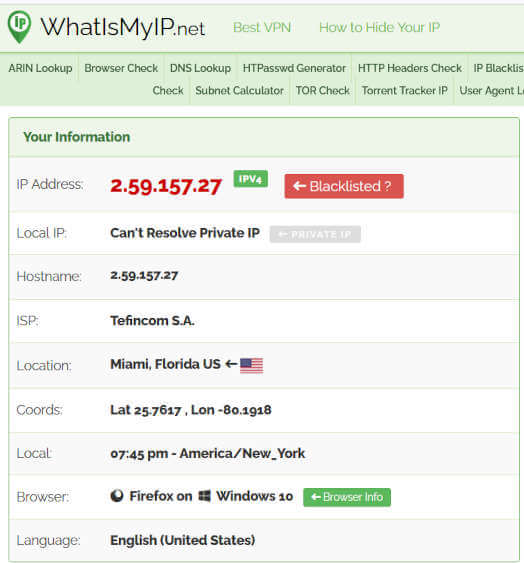
Optimizing Your VPN for Torrenting
While a VPN service like NordVPN will work for torrenting without any special settings, there are a few things you can do to optimize the process. These include:
- Select the right VPN protocol. Most VPNs support more than one VPN protocol. Since security and speed are the most important characteristics when torrenting, you want to go with the fastest, most secure protocol your VPN supports. Based on our experience and test results, the best VPN protocols for torrenting are WireGuard, NordLynx (which is built around WireGuard), and Lightway. All of the VPN services that passed muster during our torrenting tests offered one of these three top protocols. Note that VPNs with fast and secure protocols also make the best VPNs for gaming, if that is of interest to you. One popular use case here includes using a VPN for Warzone.
- Choose a P2P server whenever possible. Several VPNs offer specialized P2P (Peer-toPeer) servers. These servers are optimized for torrenting and other P2P activities and will give you the best results.
- Use a VPN server in a torrent-friendly country. Countries like Switzerland, Romania, Iceland, and Panama have robust data privacy regulations, and are not members of the Five Eyes or other intelligence alliances, making them optimal server locations for torrenting. Choosing a VPN service that is based outside such areas (NordVPN or Surfshark, for example) is also a good idea.
- Use the nearest “safe” server location. Internet connections are so fast these days that the distance between you and the VPN server can impact the speed of your torrenting. Choosing a VPN server in one of the closest torrent-friendly countries can result in faster torrenting.
- Consider using Split tunneling to separate torrent traffic from other traffic.
Split tunneling lets you decide which internet traffic is directed through a VPN and which isn’t. By only routing the torrenting traffic through the VPN, you may speed up your torrenting since your VPN client will not be bogged down processing non-torrent traffic.
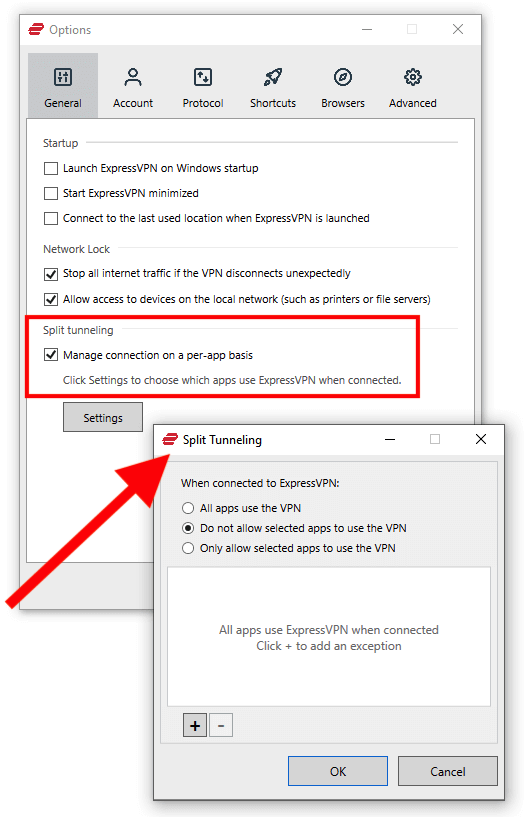
Additionally, keeping regular web traffic separated from the connection to torrenting sites reduces the exposure of non-torrenting activities to potential threats, ensuring your privacy and security while torrenting. Learn more in our guide to the best VPNs with split tunneling.
We also find split tunneling with NordVPN and ProtonVPN, as well as CyberGhost and Surfshark.
Using uTorrent with a VPN
uTorrent is a popular BitTorrent client that can be used to download and share files over the BitTorrent network. Using a VPN with uTorrent ensures privacy and security while downloading torrents. You can use a service like NordVPN with uTorrent using just the configuration steps we have already discussed simply by making sure to launch the VPN and connect it to a server before you launch uTorrent. Or you can take things one step further by binding BitTorrent to the IP address of the VPN server you will be using for torrenting.
Binding uTorrent to a VPN server is a bit complicated to do but ensures that uTorrent will not download torrents unless you are connected to the VPN server.
If you would like to take this optional step, connect to your VPN server, then follow these steps:
- Open WhatIsMyIP.net and record the IP address displayed there. It should look something like 2.59.127.89 with different numbers based on which VPN server you are connected to.
- In uTorrent, select Options, then Preferences, then Advanced.
- In the Filter field, type ip. This shows all the advanced options that have “ip” in their names.
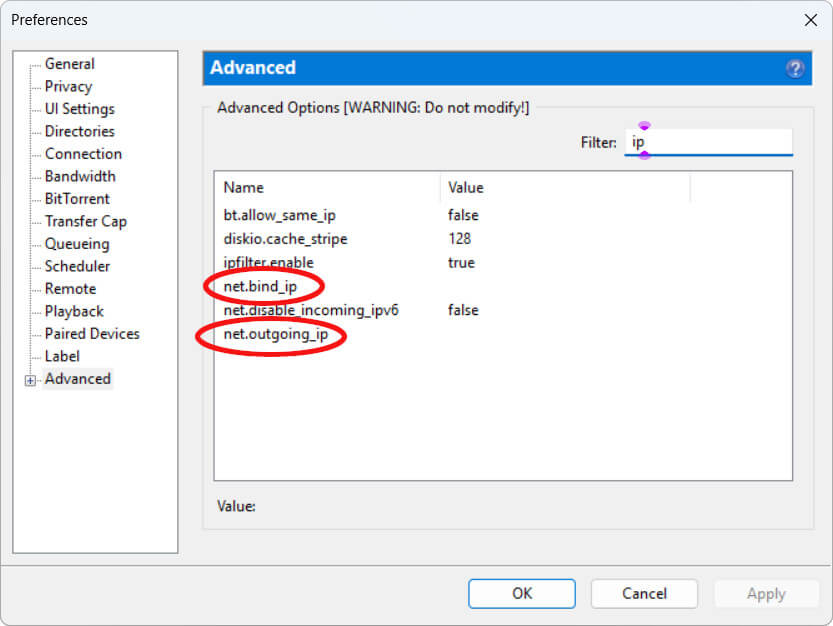
- Click net.bind_ip (circled above). Once you do that, the Value: field becomes active. Enter the IP address you recorded in Step 1, and click Apply.
- Repeat Step 4 for the net.outgoing_ip entry.
- Click Next then restart uTorrent. It will now only function when you are connected through the VPN server.
However, common issues may arise, such as torrents not downloading or slow download speeds, connection issues with peers, and VPN blocking the connection to torrent trackers.
To resolve these issues, consider restarting your PC and router/modem, updating uTorrent, checking VPN settings, connecting to different VPN servers, and disabling your antivirus and firewall.
To learn more, check out our guide to the best VPNs for uTorrent.
qBittorrent with a VPN
qBittorrent is another reliable BitTorrent client that will help you download and share torrent files using the BitTorrent protocol. Using qBittorrent with a VPN is a necessity to torrent safely. Set up your VPN service as discussed above, before you start to download torrents. Also, consider verifying your VPN connection by checking your IP address and ensuring it’s different from your real one.
See our guide to the best VPNs for qBittorrent for more details.
Legal Considerations & Safe Practices
Although torrenting is not illegal, unauthorized downloading of copyrighted material is prohibited in most countries, including the United States, Canada, UK, and more. Doing it can get you into all sorts of trouble, up to being sued by content owners, and even criminal charges.
For secure downloads, follow these steps:
- Use P2P servers in torrent-friendly countries.
Obtain torrents from trustworthy websites with established procedures to confirm file legitimacy.
Use antivirus software to scan the file before opening or executing it.
Read any reviews or comments associated with the file.
Consider using private trackers for added security.
Prevent downloading harmful files during torrenting by using reliable sources, reading comments, and scanning files with antivirus software. Be wary of cracked programs or software, suspicious file names or missing files, malware or ransomware, presence of other malicious programs, and unexplained decrease in storage space.
Summary
In conclusion, using VPNs for torrenting is an effective way to securely and efficiently share files online while maintaining your privacy and complying with copyright laws. By selecting a quality VPN service and configuring it as described in this article, you can enjoy fast, secure torrenting.
Now that you know how to use a VPN for torrenting, check out our guide to the best VPNs for torrenting to find your ideal torrenting VPN.
Related Torrenting Articles:
- Surfshark for Torrenting
- ExpressVPN for Torrenting
- IPVanish for Torrenting
- NordVPN for uTorrent
- ExpressVPN for uTorrent
- Surfshark for uTorrent
- NordVPN for qBittorrent
- Surfshark VPN for qBittorrent
Frequently Asked Questions
Here are some frequently asked questions about torrenting with a VPN:
Do VPNs work for Torrenting?
VPNs offer a secure and anonymous way to torrent safely, protecting users from being tracked by their ISP (Internet Service Provider) or other organizations. ExpressVPN and NordVPN are just two examples of high-quality VPNs that are great for torrenting. VPNs provide encryption that prevents ISP throttling of your download activities and hides your IP address from other users. They also prevent malicious actors from identifying your location and accessing your information. Some VPNs also provide P2P (peer-to-peer) servers optimized for torrent file transfers, minimizing the amount of time you are connected to torrent sites.
Which VPN location should I set for Torrenting?
To torrent safely, choose a VPN server in Switzerland, Romania, Iceland, or Panama as these countries offer strong data privacy laws and are not part of any intelligence-sharing agreements.
Can you be tracked Torrenting with a VPN?
Using a VPN is an effective way to protect your privacy while torrenting, as it encrypts your internet traffic and hides your IP address. This makes it difficult for ISPs to track your activity. Additionally, torrenting itself carries risks, as you are connecting directly with random internet users. Using a VPN will help you to torrent safely.
Are Torrenting VPNs good for Streaming?
Many people lump together streaming and torrenting when considering a VPN. This makes sense as several of the best VPNs for torrenting are also on our lists of the best VPNs for Netflix and the best VPNs for BBC iPlayer.
Is torrenting illegal?
Torrenting is legal in most jurisdictions, but downloading copyrighted material without authorization is a violation of the law. Obey the laws of your jurisdiction to torrent safely.
This guide on how to use a VPN for torrenting was last updated on May 6, 2024.

Leave a Reply